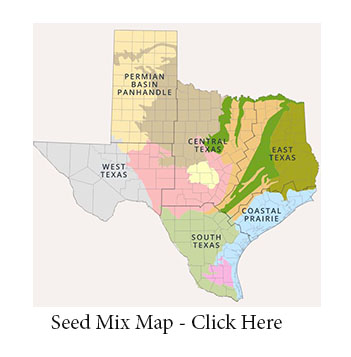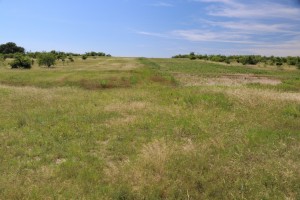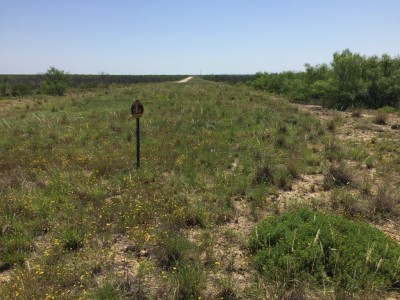
The Pipeline Prairies Initiative
 The restoration of native plant communities to pipeline rights of way is of growing interest to private landowners and energy companies in Texas. Recent advances in commercial availability of appropriate native seed sources for Texas have enabled large scale restoration of native plants throughout the state. Staff of the Texas Native Seeds Program are working to expand partnerships with the energy industry to accomplish practical, economic, and science-based restoration on new energy rights of ways being built in Texas. We believe that by doing so, large scale positive conservation impacts on wildlife, improved public perception of pipelines, better landowner-energy company relations are possible.
The restoration of native plant communities to pipeline rights of way is of growing interest to private landowners and energy companies in Texas. Recent advances in commercial availability of appropriate native seed sources for Texas have enabled large scale restoration of native plants throughout the state. Staff of the Texas Native Seeds Program are working to expand partnerships with the energy industry to accomplish practical, economic, and science-based restoration on new energy rights of ways being built in Texas. We believe that by doing so, large scale positive conservation impacts on wildlife, improved public perception of pipelines, better landowner-energy company relations are possible.
The Pipeline Prairies Initiative
TNS seeks to work together with energy industry partners and private landowners to facilitate the use of high quality, locally adapted native seed mixes on new pipelines being built in Texas. A primary function of this project will be for TNS to publish guidance on native seed mixes for each county and vegetational region in Texas based on our research, and to make this information readily available for use by landowners and industry. This seed mix guidance will utilize up-to-date information on commercial seed supply provided by Texas seed companies producing certified native seeds. The TNS Pipeline Prairies website will be maintained with an easy-to-use map to identify an appropriate seed mix for all areas of Texas.
 These efforts are not meant to restrict the choice of private landowners to choose what plants they wish to have seeded on rights of ways on their property. However, it is our aim to inform this choice on the half or more of the land impacted by right of ways that no seed mix is designated for by landowners. Simultaneously, we hope to streamline recommendations for landowners who do request specific seed mixes, and for pipeline operators who wish to plant the most effective and appropriate native seed mixes.
These efforts are not meant to restrict the choice of private landowners to choose what plants they wish to have seeded on rights of ways on their property. However, it is our aim to inform this choice on the half or more of the land impacted by right of ways that no seed mix is designated for by landowners. Simultaneously, we hope to streamline recommendations for landowners who do request specific seed mixes, and for pipeline operators who wish to plant the most effective and appropriate native seed mixes.
This effort will seek to provide some uniformity in seeding guidance, and synchronize property and project level recommendations based on research and guidance provided by a neutral party in TNS. Doing so should increase the efficiency of post-construction seeding operations and result more affordable seed mixes for the industry. More companies participating in this effort will result in growth of the native seed market for Texas, reduce seed costs benefitting all seed users, and open doors for even more restoration to be conducted in the state.

Energy companies are being sought to follow these recommendations on portions of their rights of ways or lease holdings where they have the ability to choose specific seed mixes, or where restoration guidance has not been provided by landowners. We believe that a commitment to use this guidance will be a value added proposition for right of way acquisition from some landowners.
Projects that utilize guidance provided through this effort and plant recommended native seeds for restoration in their projects will be given the Texas Native Seeds Pipeline Prairies seal of approval. We will highlight those projects and the companies conducting them on our website.
Background of the TNS Program
TNS is an externally funded collaborative initiative working to develop native seed sources and facilitate restoration of native habitats in Texas. The program is made up of a statewide network of six regional native seed increase and restoration projects. TNS is part of the Caesar Kleberg Wildlife Research Institute at Texas A&M University-Kingsville. The program is widely regarded as a successful and impactful collaborative initiative, and recently received the Texas Environmental Excellence Award for Agriculture given by Governor Abbott and the Texas Commission on Environmental Quality, and the national level group achievement award from The Wildlife Society.
History of Energy Industry Partnerships of the Texas Native Seeds Program

TNS has an almost 20 year track record of working with energy industry partners. Beginning with the South Texas Natives effort in 2001, and continuing to present in the statewide TNS effort, energy industry relationships have been extremely beneficial to achieving our mission. Examples of this these partnerships include:
-
Fifteen years of cooperative work with ExxonMobil, cumulating in a national journal publication on the restoration of former well pad sites on King Ranch, and resulting in recommendations used by energy operators and private landowners to meet this significant need.
-
A cooperative project with Pioneer Natural Resources to design native seeding specifications for the company’s Eagle Ford Shale lease holding, based on native plant communities, seed availability, and soil type. Similar work with Pioneer has also been done in the Permain Basin.
-
Seventeen years of cooperative work with ConocoPhillips to develop specific native seed supplies needed for gas field restoration in western south Texas and the Eagle Ford Shale.
-
A landmark project with Enbridge Energy Inc. and Kenedy County private landowners in 2017 to facilitate the use of monarch-butterfly friendly native seed mixes on a 42 miles section of the Valley Crossing Pipeline.
-
Collaborative work with Enterprise Products in 2018 to design, specify, and implement the use of native seed mixes on over 8,000 acres of the recently constructed Shin Oak Pipeline.
-
Ongoing work with and supported by Concho Resources, Inc. to expand the TNS Program to the Permian Basin and Panhandle Region. This work is also support by the National Fish and Wildlife Foundation Pecos River Watershed Program which is underwritten by a consortium of 8 regional energy companies.
-
Receipt of the Eagle Ford Shale Environmental Excellence Award from the South Texas Energy and Economic Roundtable (STEER), a consortium of 18 of the largest Eagle Ford operators.
-
Direct financial supporters of TNS’s work from the energy industry have included Enterprise Products, Concho Resources, Inc., Enbridge Energy, Inc., ExxonMobil, ConocoPhillips, Pioneer Natural Resources, Shell, and Trans Canada Pipeline Company.